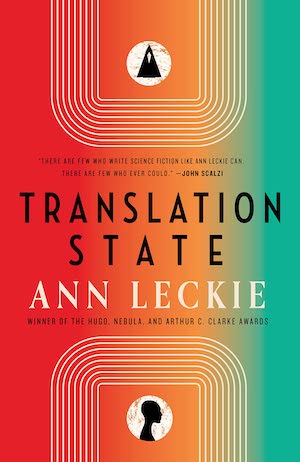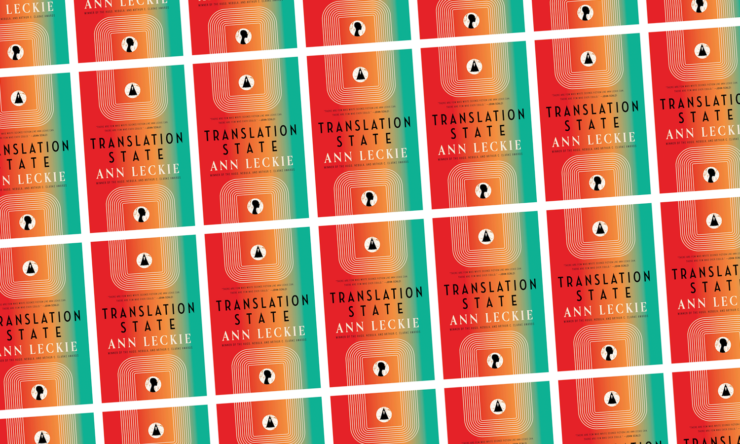Ten years ago this summer, I read an advance copy of Ann Leckie’s astonishing debut, Ancillary Justice. It was accompanied by an enthusiastic note from its publicist, and it blew me away with the vivid urgency of its narrative, and with Leckie’s approach to gender in worldbuilding, at the time a radical departure in popular science fiction. I wasn’t the only one blown away: It went on to take a record-breaking sweep of awards for a debut novel.
Ancillary Justice and its sequels, Ancillary Sword and Ancillary Mercy, are emblematic of a particular moment in modern speculative fiction, a moment when the upwelling tide of stories with an interest in gender, power, and imperialism burst forth into a popular wave. All the old speculative fiction furniture, made new and exciting again from a fresh perspective.
Ten years on, Leckie has burnished her reputation as an accomplished, versatile writer with Provenance and the Hamlet-inspired fantasy The Raven Tower. Translation State is her first novel since 2019. It’s a return to the world of the Radch, and to several of the thematic concerns of the Ancillary books, but it’s a standalone novel, and it approaches those concerns from very different angles.
Buy the Book


Translation State
Enae Athtur has spent her life, nearly six decades of it, as companion to a demanding elder relative. When Grandmaman dies, she’s pried out of her daily round and offered a commission as an accredited diplomat: Follow up the trail of a Presger Translator missing these last two hundred years. It’s make-work, meant to keep her occupied and out of the way, and to signal her home polity’s earnest goodwill in advance of a diplomatic conclave where the treaty that protects humanity from the (very) alien and powerful Presger might be up for renegotiation. No one expects she might take it seriously. But Enae has had enough of make-work, and the puzzle interests her. It ends up leading her to unexpected places.
Reet Hluid is a pipeways maintenance worker on a space station in a polity called Zeosen. An orphan found alone on a spacecraft as an infant, he’s a loved and loving part of his adoptive family, even though he’s never quite felt like he fits it. As a child he had odd urges, and as an adult he’s often brusque and not sociable in the same way as other people. He only begins to make connections when he’s approached by a diaspora group—descendants of immigrants and refugees from a neighbouring polity—who believe his unique genetic material means he’s a descendant of that polity’s former rulers. Reet is happy to make friends and explore his potential roots, but he’s a little concerned about the political undertones of the diaspora social group. When his new job, which the social group helped him get, brings him into contact with Enae though, the mystery of his background and his genetics starts to look like it could have other explanations. Is Reet the child of a Presger Translator, and thus biologically a Presger Translator himself?
Enae doesn’t mean to ruin Reet’s life by suggesting it. And when the authorities arrest Reet and pack him off to the Treaty Administration Facility against his will, she joins forces with his family to try to bring him home. Or at least to give him a choice about what happens next. The biology of Translators may prove unforgiving of many choices: In order to survive to adulthood, a Translator must merge with another person, becoming one new person in two bodies. Or they die in horrible pain.
Qven is a Presger Translator, raised among others of their kind. Unlike the other two main characters in Translation State, their story starts in early childhood. Their perspective is the reader’s window into the disorienting and disturbing alienness of the Presger Translators, in culture and in biology. The Translators’ role is to interpret between the never-seen but nonetheless palpable Presger and humans, as well as other Significant Species under the treaty. In Qven’s point of view, they are very strange indeed, but the reader slowly comes to realise that part of that strangeness is the natural savagery of solipsistic, poorly-supervised childhood: By our standards, juvenile Translators are very nearly feral, with limited information about their own biology and their own adult society. Qven’s approach to adulthood is fraught: They understand that merging with an older Translator will result in them being, essentially, eaten, overwritten and subsumed. They don’t want to merge; they want to escape. But their attempt to leave results in another adolescent nearly forcing a merge on them against their will, an attack for which they are blamed. Their only chance to survive to reach adulthood is to be very obedient, and to merge with whoever they’re told, a prospect they find less appealing than ever.
When they’re told to merge with Reet—something neither Reet nor Qven is eager about—and quartered with him, another solution offers itself. Qven, like Reet, could challenge the legal jurisdiction of the Presger Translators over their future.
But that legal case, and the treaty that keeps humanity safe from the Presger, may be cast at risk by the combined arrogance of a Radchaai ambassador and Translator Dlar. Reet and Qven, as well as Enae, must face danger together, and make choices that could determine the future of the treaty itself.
Identity, personhood, and the nature of power are themes that recur throughout Leckie’s work. They’re vividly present here, in Enae’s late-life discovery of who she is when she’s not running after her grandmother’s whims; in Reet’s feelings about his family, the politics of his diaspora social group’s affiliations, and the hierarchy of his station; in Qven’s more raw encounters with power and abuse of power in their context; and in the problematised questions of identity and personhood present both in the coming-of-age of any juvenile Presger Translator and in Reet, a juvenile Translator raised human who is, in cultural and emotional terms, as human as anyone.
The choice to present Enae’s and Reet’s perspectives from a third-person viewpoint, while Qven’s part of the story is told in the first person, is an interesting trick, one that uses the familiar intimacy of first person narration to render Qven’s life both more and less alien. They’re weird, but we’re seeing them from the inside: They’re not that strange.
Translation State is less sweeping in its narrative scope than the Imperial Radch trilogy (though its conclusion may have even more sweeping consequences for the universe in which it’s set), rooted in more personal, bounded concerns. Few of us will ever be personally involved in overthrowing a tyrant or creating a revolution, but many of us are painfully familiar with complex feelings about family, or with having our choices about our future very constrained, or with having to argue for our rights, for self-determination, dignity, and the value of our personhood, in front of a committee or tribunal, members of whom believe they know better than we do what we ought to do with ourselves—or at least, what would be easier for them for us to do. But it demands no less attention to its thematic arguments, nor to its vividly compelling protagonists. For me, the intimate, personal stakes that dominate most of Translation State‘s narrative give it even more power and force than its predecessors.
It’s also great to see a cameo or two from old friends, of course. (Hello, Sphene!)
Leckie is never less than thought-provoking, and her work is always entertaining. Translation State is a fascinating, compelling novel from an accomplished writer at the top of her game. I fully expect to see it as an awards contender in due course.
It’s a great book and I love it.
Translation State is published by Orbit.
Liz Bourke is a cranky queer person who reads books. She holds a Ph.D in Classics from Trinity College, Dublin. Her first book, Sleeping With Monsters, a collection of reviews and criticism, was published in 2017 by Aqueduct Press. It was a finalist for the 2018 Locus Awards and was nominated for a 2018 Hugo Award in Best Related Work. She was a finalist for the inaugural 2020 Ignyte Critic Award, and has also been a finalist for the BSFA nonfiction award. She lives in Ireland with an insomniac toddler, her wife, and their two very put-upon cats.










